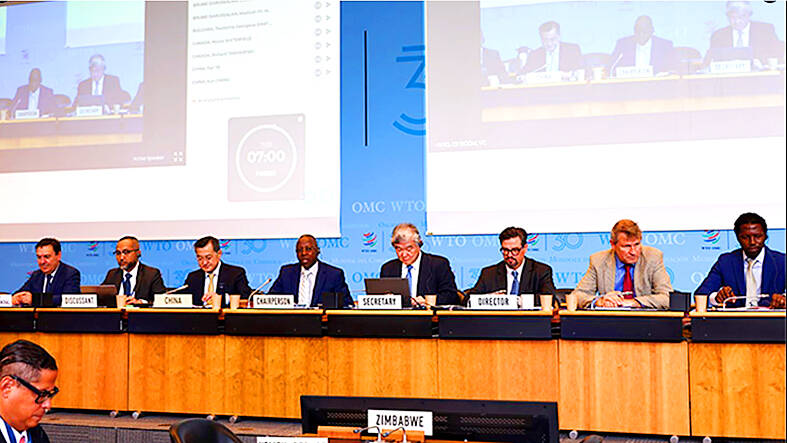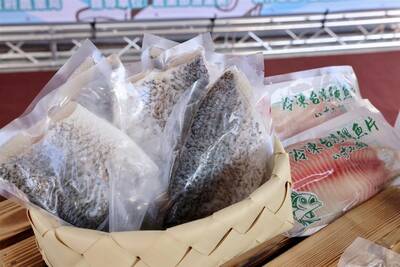China is imposing unfair trade practices, Taiwanese officials said during a WTO trade policy review on Wednesday, exposing growing group members’ discontent about Beijing.
The WHO biannually reviews the trade policies and practices of the group’s top five members. China is today expected to respond to the issues raised by the proceedings, with other countries permitted to make further comments.
Representative to the WTO Lo Chang-fa (羅昌發) called on Beijing to implement structural reforms, negotiate with Taiwan to resolve differences, and show respect for trade rules and mechanisms.

Photo: screen grab from the WTO’s X account
China has imposed restrictions on the import of Taiwanese fruits, ranging from pineapples to mangoes, asserting — without evidence — that these products pose a risk to sanitation and disease prevention, Lo said.
Beijing’s demand that Taiwanese food product manufacturers register as Chinese companies has a dubious legal basis, he said.
Chinese authorities grant business permits through an opaque and unpredictable process that rejects 67 percent of Taiwanese applications without explanation, Lo said.
China has erected trade barriers to Taiwanese products using various evaluation processes that showed prejudice against Taiwan, he said, adding that Beijing’s trade policies were vindictive and breached WTO rules.
Beijing also used enormous subsidies to support its industries, including state-owned enterprises, distorting the global market and manufacturing sector, he said.
These subsidies have harmed global supply chains and economies, including Taiwan’s solar panel and steel sectors, Lo added.
Lo urged China to respond positively to WTO members’ concerns and use bilateral negotiations to resolve problems with Taiwanese agricultural exports, business registrations of food manufacturers and trade barriers.
EU representatives called on Beijing to reform its trade policies and economy, and give up its developing nation status at the meeting, highlighting unfair trade practices and transparency issues.
China’s powerful and robust economy proves that it no longer qualifies as a developing nation, EU Ambassador to the WTO Joao Aguiar Machado said.
Beijing should renounce being a developing nation to ensure that struggling economies receive the privileges and benefits conferred by the status they deserve, Machado added.
China urgently needs to restructure its economy to be centered on services and not manufacturing to mitigate its imbalances, Machado said.
Machado also said that China’s 45 percent savings rate, unprecedented for an economy of its size and level of development, triggered a chain reaction that increased pressures in the global trade system.
Beijing would face ever-rising legal and trade pressures from other WTO members should it refuse to implement necessary reforms, he said.
China’s industrial subsidies have resulted in global market distortions and over-production that have negatively impacted a myriad of WTO member states, Machado said.
The bloc could not compete with China, since the latter used discriminatory policies against foreign imports in a bid for national economic self-sufficiency, he added.
European companies have also become increasingly concerned about the politicization of the Chinese economy, he said, adding that Beijing had used measures impacting trade and commerce to leverage EU members.
China’s copyright practices, laws regulating the Internet, demands for technology transfers and broad definition of national security have worsened the business environment, Machado said.
The WTO in a report later that day said it could not obtain sufficient information to assess China’s subsidies for crucial industrial sectors, including electric vehicles, aluminum and steel, citing an “overall lack of transparency.”
Beijing provided financial support and other incentives to industries during the review period between 2021 and this year, the group said.
“The overall lack of transparency in China’s government support might also contribute to debates on what is perceived by some as overcapacity in certain sectors,” it said, adding that industries that received aid ranged from semiconductors to shipbuilding.

Taiwan's Vice President Hsiao Bi-khim (蕭美琴) said Saturday that she would not be intimidated by the Chinese Communist Party (CCP), following reports that Chinese agents planned to ram her car during a visit to the Czech Republic last year. "I had a great visit to Prague & thank the Czech authorities for their hospitality & ensuring my safety," Hsiao said on social media platform X. "The CCP's unlawful activities will NOT intimidate me from voicing Taiwan's interests in the international community," she wrote. Hsiao visited the Czech Republic on March 18 last year as vice president-elect and met with Czech Senate leadership, including

There have been clear signs of Chinese Communist Party (CCP) attempts to interfere in the nationwide recall vote on July 26 in support of Chinese Nationalist Party (KMT) legislators facing recall, an unnamed government official said, warning about possible further actions. The CCP is actively involved in Taiwanese politics, and interference in the recall vote is to be expected, with multiple Chinese state media and TAO attempts to discredit the Democratic Progressive Party (DPP) and undermine public support of their recall movement, the official said. This interference includes a smear campaign initiated this month by a pro-Beijing Hong Kong news outlet against

A week-long exhibition on modern Tibetan history and the Dalai Lama’s global advocacy opened yesterday in Taipei, featuring quotes and artworks highlighting human rights and China’s ongoing repression of Tibetans, Hong Kongers and Uighurs. The exhibition, the first organized by the Human Rights Network for Tibet and Taiwan (HRNTT), is titled “From the Snowy Ridges to the Ocean of Wisdom.” “It would be impossible for Tibetans inside Tibet to hold an exhibition like this — we can do it. because we live in a free and democratic country,” HRNTT secretary-general Tashi Tsering said. Tashi Tsering, a Taiwan-based Tibetan who has never

A first shipment of five tons of Taiwan tilapia was sent from Tainan to Singapore on Wednesday, following an order valued at NT$600,000 (US$20,500) placed with a company in the city. The products, including frozen whole fish and pre- cooked fish belly, were dispatched from Jiangjun Fishing Harbor, where a new aquatic processing and logistics center is under construction. At the launch, Tainan Mayor Huang Wei-che (黃偉哲) called the move a “breakthrough,” marking Taiwan’s expansion into the Singaporean tilapia market. Taiwan’s tilapia exports have traditionally focused on the United States, Canada, and the Middle East, Huang said, adding that the new foothold in